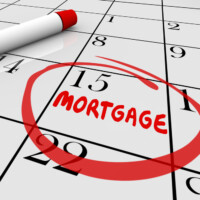
Just over eight per cent of homeowners with a mortgage missed an essential payment such as their mortgage, utility bill, credit card or loan repayment.
According to the Which? Consumer Insight Tracker, this is the third-highest figure since it started tracking the data in April 2020. It is also marginally lower than the record high of 8.5 per cent.
The consumer champion said the rise has largely been driven by an increase in missed household bills and debt repayments.
It revealed 4.8 per cent of households missed a utility bill payment, up from 2.8 per cent recorded in the previous month. Meanwhile, for credit cards and loans, the figure nearly doubled in the month from 2.4 per cent to 4.7 per cent.
The chart below (source: Which?) shows the percentage of mortgage holders who have missed payments since April 2020 (click to expand):
It’s not just mortgage holders who are struggling, as one in seven renters and 1.6 per cent of those who own their homes outright have also missed paying essential bills.
Which? said: “This is perhaps unsurprising, with rising rents continuing to heap financial pressures on tenants.”
Budget adjustments and ‘impossible choices’
To counter the effects, more than half of households (54 per cent) reported making at least one adjustment to cover their essential spending on bills, groceries, supplies and medicines.
However, this figure is down on the 60 per cent who reported doing the same last March.
For some, they’ve cut back on essentials, others have dipped into savings, while others have resorted to selling possessions or borrowing money.
At the same time, consumer confidence is falling, with 31 per cent of the 2,000 polled saying they think their financial situation will worsen over the coming year. This compares to the 24 per cent who are more positive about their finances, expecting it to get better in the next year.
Which? said: “These fears have in part been sparked by concerns over upcoming council tax rises, with seven per cent of those expecting their finances to worsen specifically expressing concern about a rise in these bills from next month.”
David Cheadle, chief operating officer at National Debtline, said: “This high level of missed payments shows the impossible choices being faced by millions of households in this time of high costs.
“With both mortgage and rent payments up significantly, household finances are under increasing pressure. We can sadly expect many more people to fall into problem debt in the coming months.
“Anyone who is struggling can seek help from a free debt advice service like National Debtline. Our advisers can talk through your situation to find the best option for you.”
Help for household bills
If you are struggling, here’s what you should do depending on the type of bill payment missed, according to the Which? team:
Mortgage payments
If you’re worried about meeting your mortgage repayments, contact your lender to discuss what support options may be available.
Lenders may offer measures such as temporary payment holidays, extending the term of the loan to reduce your monthly repayments, or moving you onto an interest-only mortgage for a short period of time.
If you’re coming to the end of your fixed mortgage term, you might be facing the prospect of higher repayments when you come to remortgage. Consider speaking to a mortgage broker for advice on your options.
Rent payments
If you’re struggling to pay your rent, contact your landlord or letting agent to see if you can reach a compromise. You should aim to do this before you miss a payment, and be honest about your circumstances and what you can afford to pay.
Utility bills
If you’re worried about paying your bill, get in touch with your energy provider to find out what it might be able to do to help you.
This could include changing the frequency of your payments, moving you onto a different tariff or helping you access a hardship fund.
Credit cards and loans
You should prioritise your housing and utility bills before dealing with credit card or loan debts.
If you think you’re going to miss your repayment, again, contact your lender in the first instance.
They may offer you a repayment plan to pay off the debt over a set number of years or temporarily pause your repayments.















